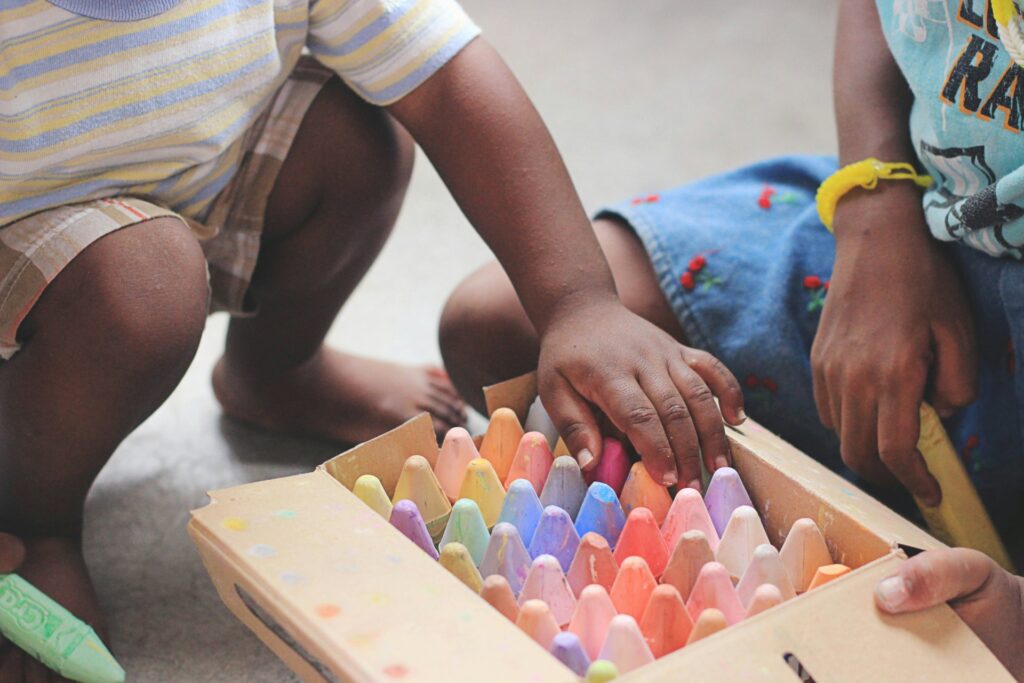Data collection for the second round of South Africa’s largest survey of preschool child development, the Thrive by Five Index 2024, concluded in November. Led by the Department of Basic Education and coordinated by DataDrive2030, the Index assessed a nationally and provincially representative sample of 4-year-old children enrolled in early learning programmes (ELPs) in all 9 provinces. The 2024 Index also included a test sample of 4-year-old children who are not attending an ELP, and collected data on the characteristics of ELPs and homes that influence child development outcomes.
Over 5,200 children aged 50 to 59 months were assessed in their mother tongue using locally developed, standardised measurement tools that have been rigorously tested to ensure validity, reliability, and fairness (further information on the ELOM tools is available here).
Children were sampled from more than 1,400 ELPs located within 432 Primary Sampling Units – PSUs (between 35-76 per province). In addition, at each of the ELPs, interviews were conducted with children’s practitioners and principals; an observational learning programme quality assessment was done; and a site assessment of basic infrastructure was completed. Telephonic interviews were also conducted with ±75% of the assessed children’s primary caregivers, collecting information on household socio-economic status, the child’s birth weight and gestational age, immunisation status, pregnancy risk factors, birth registration and child support grant access, maternal wellbeing, the home learning environment, child multilingualism, household hunger, sleep routines, and father involvement.
This is the largest and most comprehensive survey to date on preschool child outcomes in South Africa. The 2024 Index will provide nationally and provincially representative data on the proportion of 4-year-old children enrolled in ELPs who are On Track for their age in the following key areas of development:
- Gross Motor Development
- Fine Motor Coordination and Visual Motor Integration
- Emergent Numeracy and Mathematics
- Cognition and Executive Functioning
- Emergent Literacy and Language
- Social and Emotional Functioning
- Physical growth (height for age)
It will also deepen the understanding of child, primary caregiver, household and ELP characteristics, principal and practitioner beliefs and behaviours, and environmental factors that are associated with these key child outcomes.
Developing the ELP Sampling Frame involved creating a comprehensive list of ELPs in all selected wards (PSUs) from various existing data sources and then verifying and expanding this list through fieldwork in the form of ELP visits. Following on from the 2021-2022 ECD Census, this listing data will provide valuable insights into the changing landscape of ELP provision.
In addition to the enrolled sample of children, an experimental sample of 280 non-enrolled children in 3 provinces was included in the study to understand barriers to ELP access and the consequences thereof for young children. These children were identified through systematic household screenings within selected wards (PSUs).
A second experimental study with a subset of participating ELPs was conducted in partnership with the South African Medical Research Council. This involved the collection of water, soil, and dust samples from 71 ELPs in Gauteng and the installation of temperature gauges within these sites over a period of 6 months. This substudy will allow us to examine the effects of heavy metal exposure and heat on children’s early learning and physical growth.
The Thrive by Five Index data enables us –
- To determine the proportion of young children in South Africa who attend ELPs who are on track for their age in key areas of development; and identify which populations of children are most at risk;
- To monitor trends in performance gaps and gains over time and across socio-economic groups;
- To explore a range of potential predictors of child outcomes;
- To track progress in the attainment of local and global development goals for young children and to hold ourselves accountable for these;
- To make evidence-based decisions at multiple levels and across various stakeholder groups.
Every ELP is geolocated allowing for merging with other existing datasets to enable researchers to explore the relationship between child outcomes and broader influences. Additionally, over 90% of the more than 4,000 interviewed primary caregivers gave consent for us to follow up with them, should we want to track their children’s development over time, presenting exciting opportunities for longitudinal research.
The Index is a multi-sectoral partnership
The Index is a multi-sectoral partnership, led by the Department of Basic Education and coordinated by DataDrive2030.
The Index team comprises technical experts in a range of fields including sampling and weighting, psychometrics, assessor training and inter-rater reliability, survey technology, fieldwork management, data management and quality assurance and quantitative research methods. In the development of the survey instruments, leading local and global experts were consulted to ensure that the Index measures what matters, and that the collected data is reliable and valid.
A steering committee provides strategic oversight and includes representatives from the Departments of Basic Education, Health, Social Development, Treasury, Statistics South Africa, and the Presidency.
The FirstRand Foundation, The LEGO Foundation, This Day, and Yellowwoods are the funding partners of the Thrive by Five Index 2024.
| Invitation to participate in a working paper series To promote widespread use of the data for driving change, the 2024 Index dataset will be made open access by the end of 2025. For those wanting earlier access to the data, there is an opportunity to partner with DataDrive2030 on a series of working papers covering topics adjacent to our core research questions. For more information on this opportunity, please email Simone@datadrive2030.co.za. |
Note: The numbers indicated above are estimates, as the data is still in the process of being cleaned and weighted.


